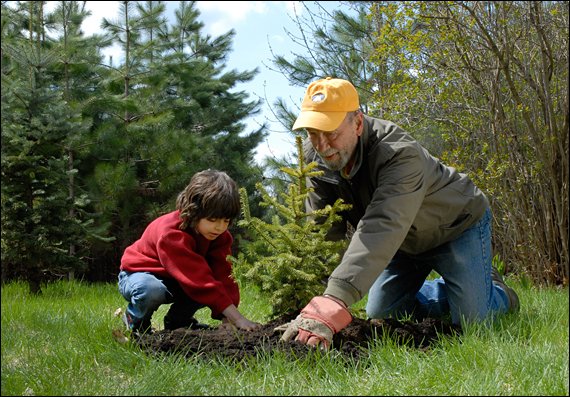Today in a Sikh family setting, I imagine it is not only a linguistic gulf which separates elders from youngsters, but one of lifestyle and the attitudes which underpin our interaction with environment. Any initial shock they may have had at what goes into the garbage bin, the time that gets spent in front of the TV, or the wastage of food at large scale family functions, has probably dulled down over time to quiet tolerance. In some families, however, an environmental consciousness has filtered through, for example, through the tradition of covering one’s head and meditatively chanting whilst preparing a meal, saying a short prayer before and after eating, and ensuring minimum wastage, so cultivating the qualities of gratitude and respect.
 I
recall some rare sightings of elderly, green-fingered Sikhs who
visit their allotments on the edge of the
Sandwell Valley, near where I live in Birmingham – and the touching
scene of one such grandfather helping a young child to pat down some
soil around a newly bedded plant. There are also memories both my
husband and I have of our grandmothers, whose love for the earth has
passed into family folklore. One was famed for growing even
strawberries in winter, such was her tender loving care and
gardener’s intuition; another would be found drying melon seeds or
tangerine skins in the sun, ready for some home remedy or beauty
preparation. No matter who we are, the habit of being economical and
efficient with resources, and ever-ready to recycle, characterised
our grandparents’ generation.
I
recall some rare sightings of elderly, green-fingered Sikhs who
visit their allotments on the edge of the
Sandwell Valley, near where I live in Birmingham – and the touching
scene of one such grandfather helping a young child to pat down some
soil around a newly bedded plant. There are also memories both my
husband and I have of our grandmothers, whose love for the earth has
passed into family folklore. One was famed for growing even
strawberries in winter, such was her tender loving care and
gardener’s intuition; another would be found drying melon seeds or
tangerine skins in the sun, ready for some home remedy or beauty
preparation. No matter who we are, the habit of being economical and
efficient with resources, and ever-ready to recycle, characterised
our grandparents’ generation.
 I
take a peep into the lives of Sikh environmentalists who have
redefined their lives against all odds and are contributing in the
same manner as our elders did. Education lies at the heart of the
ceaseless environmental work of Pardeep Singh Rai. Landscape
gardener, educator and activist, he is a rare voice in the UK Sikh
community devoted to raising environmental awareness and introducing
practical change, which he does by drawing on his spiritual,
cultural and, indeed, agricultural heritage as a Sikh and Punjabi.
He is also founder of DEEP – Defenders of the Ecology and
Environment of the
Punjab and campaigns to bring attention to the ecocide of the ‘land
of five rivers’ (from panj – ‘five’, and ab – ‘water’), the
birthplace of Sikh tradition.
I
take a peep into the lives of Sikh environmentalists who have
redefined their lives against all odds and are contributing in the
same manner as our elders did. Education lies at the heart of the
ceaseless environmental work of Pardeep Singh Rai. Landscape
gardener, educator and activist, he is a rare voice in the UK Sikh
community devoted to raising environmental awareness and introducing
practical change, which he does by drawing on his spiritual,
cultural and, indeed, agricultural heritage as a Sikh and Punjabi.
He is also founder of DEEP – Defenders of the Ecology and
Environment of the
Punjab and campaigns to bring attention to the ecocide of the ‘land
of five rivers’ (from panj – ‘five’, and ab – ‘water’), the
birthplace of Sikh tradition.
Rai is also coordinator of the Environmental Group for the Punjabis in Britain All-Party Parliamentary Group which has met on issues such as the ‘Pesticide Dilemma’ in November 2005. Born in Malaysia, Pardeep spent part of his childhood in the Punjab, which unleashed his fascination for the age-old relationship Punjabis have had with their natural surroundings. ‘There is a well known Punjabi proverb which shows this love of nature,’ remarks Rai: ‘God sleeps in the tree, dreams in the animals and wakes in man’.
His stay also brought to life the imagery from nature which permeates the compositions of Gurbani, providing an abundance of metaphor to depict the stages of the spiritual journey. He gives the example of Barah Maah, the ‘Twelve Months’, which evoke the changing seasons to explore the evolving state of the human being seeking union with her Creator.
‘In this way, we come to see ourselves bound in both a physical and metaphysical relationship with the phenomena of nature,’ he continues. ‘This has a far-reaching impact on how we understand the process of ethical-decision making. In our present-day secular ociety the individual person is viewed as having autonomy in such matters. Traditionally in Sikh culture, the person is viewed as a combination of mind, soul and ody in the context of family, culture, environment and nature.
Thus, he or she is seen not as autonomous but rather as intimately integrated with extended family, community and the natural world. This suggests we need a holistic approach to ethical and environmental matters. Sadly, many Sikhs today appear to be indifferent and unresponsive to the degradation of the environment in Punjab and our planet earth. This is a disservice to Sikhism and human kind!’ Rai dedicates himself to a range ecological initiative both locally and nationally in UK, with an intricate knowledge of bio-diversity to be found from one context to another. He also designs gardens, incorporating his concerns for sustainability, maintaining a holistic approach and drawing out a sacred dimension. He continues to channel energy towards the Sikh community specifically, compiling reports such as ‘The Green Action Guide for London’s Gurdwaras.
‘The Gurdwara as an Environmental Sanctuary’ and ‘Healthy Eating for the Sangat’. Changing community habits, he admits, is a slow and uphill struggle. To further this work, he helped to launch, in May 2008, the Sikh Environmental Network. London-based Rai outlines other environmental work being done by Sikhs in the UK, such as that of Parminder Garcha who has helped to set up a community garden in Birmingham with the aid of a local Sikh women’s group. Khalsa Wood, a project based within Bestwood Country Park on the northern urban fringe of Nottingham, engages local Sikhs to play an active role in restoring the park. Non-Punjabi Sikhs, many of whom were inspired by Harbhajan Singh Yogi, are probably in the vanguard of Sikhs actively promoting healthy lifestyles with an environmental conscience. Some, such as the French-born Sikh couple who founded Aquarius Health in Cyprus, made a decision to move away from city life in west London and work towards establishing an eco-friendly health centre in Cyprus. Another French-born Sikh, who embraced the faith through personal encounter with practitioners of the tradition, now runs Raza organic farms in the Punjab.
None of those mentioned here are ‘representative’ of Sikhs in Britain, no more so than Monty Don, the BBC’s organic gardener, is representative of the ‘British’ lifestyle. But they provide examples of individuals whose enterprises draw very consciously upon Sikh spiritual and cultural heritage, whose character is linked to the land and traditions of rural Punjab. Sikh teachings are emphatic that religion is not to be a form of escapism from the world. Those who take the decision to move from city to country seem to be driven instead by a hope to create new models for living, and increase self-sufficiency in order to survive some of the problems which may befall us with a possible scarcity of resources in the future. In the meantime, other Sikh organisations, like the Nishkam Civic Centre in Birmingham, are working to foster greater well-being, cohesion, educational nurture and social care within the environment of the city, with the idea that once understanding and peace is generated in the human mind, greater and more sustainable peace is possible within society.
This is echoed by Rai’s concluding words: ‘Guru Nanak teaches me that the reality humans have created around themselves is a reflection of their inner state. The current instability of the natural system of the earth, the external environment of human beings, is only a reflection of the instability and pain within humans. The increasing barrenness of the earth’s terrain is a reflection of the emptiness within the human soul.’ How might this barrenness be overcome? The closing message of the sacred volume of scripture, which Sikhs revere as Guru Granth Sahib, offers an answer: Nanak, nam milai ta jiva(n), tan man theevai haria – Says Nanak, by receiving the blessing of Nam - the divine name of God-consciousness - I would learn to truly live, with mind and body blossoming forth in radiant greenery.’
Gopinder Kaur is an activist on many issues, with several books to her credit. She graduated in French and Russian from the University of Cambridge. She has worked for cross-cultural children’s book publishers Barefoot Books. She has a keen interest in linguistics and cultures, has given many radio talks on Sikh affairs. Significantly, she has prepared the Punjabi curriculum for the European Union.
